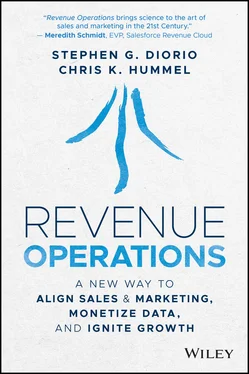Stephen Diorio - Revenue Operations
Здесь есть возможность читать онлайн «Stephen Diorio - Revenue Operations» — ознакомительный отрывок электронной книги совершенно бесплатно, а после прочтения отрывка купить полную версию. В некоторых случаях можно слушать аудио, скачать через торрент в формате fb2 и присутствует краткое содержание. Жанр: unrecognised, на английском языке. Описание произведения, (предисловие) а так же отзывы посетителей доступны на портале библиотеки ЛибКат.
- Название:Revenue Operations
- Автор:
- Жанр:
- Год:неизвестен
- ISBN:нет данных
- Рейтинг книги:3 / 5. Голосов: 1
-
Избранное:Добавить в избранное
- Отзывы:
-
Ваша оценка:
- 60
- 1
- 2
- 3
- 4
- 5
Revenue Operations: краткое содержание, описание и аннотация
Предлагаем к чтению аннотацию, описание, краткое содержание или предисловие (зависит от того, что написал сам автор книги «Revenue Operations»). Если вы не нашли необходимую информацию о книге — напишите в комментариях, мы постараемся отыскать её.
Revenue Operations: A New Way to Align Sales and Marketing, Monetize Data, and Ignite Growth
Revenue Operations
Revenue Operations
Revenue Operations — читать онлайн ознакомительный отрывок
Ниже представлен текст книги, разбитый по страницам. Система сохранения места последней прочитанной страницы, позволяет с удобством читать онлайн бесплатно книгу «Revenue Operations», без необходимости каждый раз заново искать на чём Вы остановились. Поставьте закладку, и сможете в любой момент перейти на страницу, на которой закончили чтение.
Интервал:
Закладка:
Thus, it's no surprise that the vast majority of the senior growth leaders we spoke to in writing this book were taking steps to better align sales, marketing, and service teams to sustain and accelerate growth in light of the forces and dynamics we have outlined here. Over 90% were actively redefining the way they “architect” their selling channels and consolidating the operations that support selling and oversee customer data and technology assets. Eighty-five percent of CXOs were actively reconfiguring the roles and assignments on their revenue teams to improve the customer experience and grow the value of their accounts. And over 9,000 businesses have introduced “CXO” roles with a broader span of control over sales and marketing and a CEO mandate to lead commercial operations, systems, and processes across the entire business. Most significantly, almost all of them – regardless of company size or the industry they serve – believe fixing the commercial model in light of these market trends requires leadership from the CEO to succeed and a common purpose across every employee that touches the customer.
The CXOs we spoke with are also working to find ways to generate greater returns from the systems and technologies that support selling. Most feel their investments in CRM, digital selling infrastructure, sales enablement technology, and data assets are underperforming. They feel like they are working increasingly harder at the care and feeding of these tools, rather than the tools working harder for them. They feel their sales and marketing technology stacks have become too complicated. The majority tell us they are trying to rationalize, simplify, and better connect the many solutions in their sales technology stack. They are doing this to simplify the seller workflow, better leverage customer insights in day-to-day selling, and turn technology into a “force multiplier” to help them sell more for less.
This shift in focus is happening across businesses large and small, in every industry. Executives we spoke with agree on the importance of Revenue Operations, even if – until now – there has been little clarity on an exact definition or description of this still-maturing discipline. This book intends to change that.
CHAPTER 2 Create Value and Impact from Revenue Operations
We interviewed and surveyed hundreds of business leaders as part of our primary research. These included CEOs and leaders of growth-oriented businesses, large and small. In parallel we worked with the leading academics across the disciplines of marketing, sales, and service, as well as experts in areas like customer analytics, sales enablement, and marketing technology. Our research team evaluated thousands of technologies that are shaping and enabling the modern commercial model.
Most of the executives we interviewed described Revenue Operations as a system (or commercial model) for generating more sustainable and scalable business growth. The majority told us that Revenue Operations is an important if not existential business issue. They also felt that it was not fully developed as a business discipline, but it must become one because everyone will need to understand better if they expect to do their jobs, get promoted, and succeed in the marketplace.
Given the volume of online discussion traffic on the topic, it seems like many organizations are trying to deploy Revenue Operations in some form. Current research estimates project high levels of Revenue Operations adoption, particularly among smaller business-to-business organizations and technology businesses shifting to a recurring revenue model. For example, Forrester Research suggests over two-thirds of organizations have already deployed Revenue Operations – either partially (58%) or fully (an additional 10–15%). 127 Gartnerforecasts that most (75%) of the highest-growth firms will have deployed a Revenue Operations model by 2025. 17
In a broad sense, these forecasts are correct. The executives we spoke with intuitively know they must do more to align their teams and get technology working harder for them. Most of them are actively taking steps toward unifying marketing, sales, and service.
The leaders we interviewed regard these projections with a mix of urgency, optimism, and caution. These rosy adoption forecasts create a certain fear of missing out on a big thing and an urgency to act faster, yet they also give pragmatic executives pause. While most agree that Revenue Operations is a good thing, nobody has really defined it nor demonstrated the depth of how it can work. The how needs to be laid out, too.
More than 90% of the senior executives we spoke with were not clear on what exactly a Revenue Operations model meant – or how exactly it will pay off. This includes CEOs and executives who were actively taking steps toward unifying sales, marketing, and service.
This is not surprising because describing Revenue Operations is similar to describing great art, writing, or music. Most people agree it's a good thing, and everybody seems to know it when they see it, but few people can describe it. This ambiguity has allowed at least a dozen inconsistent definitions of Revenue Operations to flourish in written research, analyst reports, and software marketing and ads. These definitions range from a methodology to a strategy to a job function, software platform, and organization design.
This wide variety of inconsistent descriptions creates a practical challenge. If nobody agrees or understands what Revenue Operations is, how can analysts empirically prove that companies that deploy Revenue Operations are growing sales and creating value? If you cannot quantify the value of Revenue Operations, how can you size and sequence the effort involved in achieving it?
This book will lay out a clear execution blueprint for the individuals who must make Revenue Operations a reality – from the CEO to operations professionals to sellers engaging customers on the front line.
How Revenue Operations Creates Value
An analysis of the third-party research published by analysts, consultants, and solutions providers strongly supports the shift to Revenue Operations as a way to improve rep productivity and firm financial performance. Aligning the revenue-centric teams in marketing, sales, and service around a common workflow will also produce value in a variety of meaningful ways, including:
Productivity: Rep productivity gains ranging from 10 to 60%. 26, 47
Growth: Revenue growth improvements ranging from 19 to 31%. 45, 17, 26
Ramp: The speed of ramping new sales reps of up to 60%. 23
Churn: Reducing rep churn by 75% or more. 23
Quota attainment: Improvements in quota attainment.
Value: Increases in firm value range of up to 71%. 21
Although these are generalized business impact estimates, their collective bias suggests a significant and tangible opportunity. Until now, the current body of research has not yet answered the questions being asked by the senior executives our team interviewed. So far, research has failed to clearly define what a Revenue Operations model is, how those gains are being realized, and who specifically is achieving them. Broadly forecasting the financial benefits of moving to a Revenue Operations model in the absence of a concise definition of Revenue Operations or a few years of operating data is tricky.
This book tries to fill that gap by providing CEOs, CXOs, and their teams greater clarity on the financial contribution the Revenue Operations model makes to the business. We lay this contribution out in terms of the ability to meet or exceed top-line revenues targets while improving profits and growing firm value.
By working with hundreds of growth leaders and leading academics in the “science of growth,” we and the rest of the faculty of the Revenue Enablement Institute were able to isolate the specific financial, operational, and management levers that CXOs need to pull to realize measurable benefits and put in place key leading and lagging indicators on what is going to be a multiyear transformation. According to the CXOs we interviewed, it is possible to achieve immediate financial gains and demonstrable signs of progress from taking specific and measured actions:
Читать дальшеИнтервал:
Закладка:
Похожие книги на «Revenue Operations»
Представляем Вашему вниманию похожие книги на «Revenue Operations» списком для выбора. Мы отобрали схожую по названию и смыслу литературу в надежде предоставить читателям больше вариантов отыскать новые, интересные, ещё непрочитанные произведения.
Обсуждение, отзывы о книге «Revenue Operations» и просто собственные мнения читателей. Оставьте ваши комментарии, напишите, что Вы думаете о произведении, его смысле или главных героях. Укажите что конкретно понравилось, а что нет, и почему Вы так считаете.











